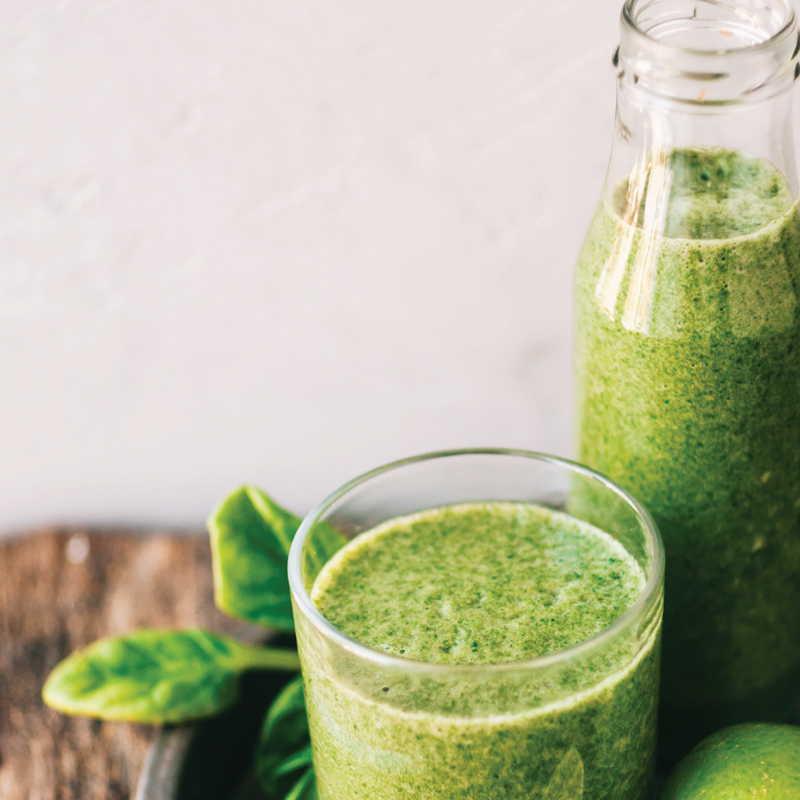
5 most common food intolerances
If you’ve ever been to see a Naturopath, chances are they’ve told you to cut out certain foods. Trust me, we don’t do it for fun! There’s a very good reason why — these foods are some of the biggest culprits for intolerances.
It’s estimated that 1 in 5 people may have a food intolerance, but it’s common for people to ignore or put up with symptoms to the point where it becomes ‘normal’ even though the quality of their daily life may be suffering.
While food intolerances aren’t life-threatening like some allergies, they can cause problems for you if you continue to ignore them.
What is a food intolerance?
A food intolerance is an IgG response by your immune system, which results in symptoms that occur hours or even days after exposure to certain foods. The good news is that food intolerances are treatable with a little time and patience.
In comparison, an allergy is an IgE immune response to something it perceives as foreign or harmful. Think of immediate reactions like anaphylaxis, hives, asthma and swelling.
The most common food intolerances:
1. Dairy
This is one of the first foods we Naturopaths ask our patients to cut out — sorry! We do this for many reasons, but mainly because it is often a culprit for food intolerances. There are two reasons for this — lactose and casein.
Lactose intolerance occurs when you lack the enzyme lactase, which breaks down lactose (milk sugar) so that it can be absorbed. The symptoms include wind, bloating, abdominal pain and altered bowel movements.
Casein is one of the proteins in milk and it has a very similar molecular structure to gluten. Interestingly, it has been estimated that 50% of people who are gluten intolerant are casein intolerant as well. That’s why lactose-free dairy can often still be a no-go for people.
Symptoms of dairy protein intolerance:
-
Eczema
-
Asthma
-
Hayfever
-
Bloating
-
Skin problems
-
Abdominal pain
-
Gas
-
Diarrhoea
-
Nausea
Sounds lovely, right? Well, the good news is giving up dairy will give you instant relief! If you think you are intolerant to dairy protein or lactose, it’s best to avoid:
-
Milk
-
Cream
-
Ice cream
-
Cheese
-
Yogurt
Eat instead:
-
Milk — try almond milk, rice milk or coconut milk
-
Cheese — try cashew cheese, trust us!
-
Ice cream — try coconut-based ice cream or make your own banana nice-cream with frozen bananas
2. Gluten
Gluten is a protein found in wheat and grains like rye and barley. It’s part of what allows bread to rise however it’s hard to digest and may cause inflammation. About 1 in 7 Australians now reports sensitivity to eating wheat. That’s almost 3.4 million people!
People who have celiac disease cannot tolerate gluten at all, as it triggers an autoimmune response that can cause damage to their gut wall. This can interfere with nutrient absorption and can cause a long list of symptoms, as well as leading to other problems like nerve damage, infertility, osteoporosis and even seizures.
However, many people have an underlying intolerance or sensitivity to gluten that may be disrupting their digestion, causing discomfort or pain and ultimately, leading to all sorts of issues including skin problems, hormone imbalances and autoimmune conditions.
Not long ago, gluten intolerance was diagnosed by a process of elimination. Today it can be identified with a simple IgG food intolerance test.
The symptoms of gluten sensitivity are very similar to those of celiac disease:
-
Bloating
-
Abdominal pain
-
Diarrhoea or constipation
-
Headaches
-
Fatigue
-
Joint pain
-
Skin rash
-
Depression or anxiety
-
Anemia
If you think you have gluten intolerance, it’s best to avoid foods that contain gluten:
-
Bread or baked goods
-
Wraps
-
Pasta
-
Pizza
-
Couscous
-
Barley
-
Rye
-
Cereals
-
Crackers
-
Beer
-
Also be careful of sauces, dressings, gravies, seasonings and condiments.
Eat instead:
Thankfully, there’s a long list of foods that DON’T contain gluten, and this list is growing as gluten intolerance has become more common. While it might be tempting to try all of the gluten-free snacks and desserts that are now widely available, we still recommend eating as close to nature as possible, even when you’re eating GF. You may be surprised, but it actually makes it much easier to know what’s in your food!
One of the hardest things to give up when going gluten-free is bread. There’s always the vege alternatives like lettuce wraps and mushroom buns, but sometimes you just want a sandwich! The good news is that there are now LOTS of options to choose from – we’ve helped you out by compiling our favourite gluten-free bread recipes.
3. Egg
This can’t be right, eggs are good for everyone! Right?
Well, that’s not always the case! For some people, egg intolerance can contribute to skin conditions like eczema and gut symptoms like bloating, wind and bowel variability. If you have an intolerance to egg, your body may react to the protein in either the white, the yolk or both.
If you have an egg intolerance, it’s best to avoid eggs altogether. This includes those from ducks, quails and geese, which contain similar proteins to chicken eggs.
Symptoms of an egg intolerance:
-
Digestive complaints like IBS, bloating or stomach ache
-
Severe headaches and migraines
-
Skin issues like eczema, acne, itchiness and rashes
-
Tiredness and fatigue — a lack of energy, ‘brain fog’ or lethargy
-
Joint pain — persistent aching or swelling of the joints
-
Depression or anxiety
-
Respiratory complaints like sinusitis and rhinitis
If you think you have an egg intolerance, it’s best to avoid:
-
Bread and cakes
-
Quiches
-
Desserts
-
Sauces and spreads
-
Mayonnaise
-
Ice cream
-
Some meat products
Eat instead:
1 egg makes up about 15% of your daily protein intake, so eggs are important particularly for those following a vegetarian diet. Eggs are a source of Vitamin A, B, D and E and also provide calcium, phosphorus and iron. To ensure you eat a balanced and nutritious diet when omitting eggs, include a varied mix of the following foods:
-
Milk, meat and fish-based proteins
-
Beans and legumes
-
Nuts and seeds
When looking to directly replace egg in cooking or baking, there are alternatives which mimic the binding or thickening properties of egg such as:
-
‘Ogran No Egg’
-
Mashed fruits (binding)
-
Cornstarch (thickening)
-
Avocado
-
Psyllium husk
-
‘Chia egg’ — mixing water and chia seeds as a binding agent
4. Almonds and other nuts
Almonds are high on our list of intolerances, probably because we’re now eating more almonds in the form of almond milk or flour in our quest to avoid dairy and gluten! Now this is getting ridiculous! However, don’t despair — when treating food intolerances, we avoid the foods that you are intolerant to for a period of time while we work on healing the gut. These foods are then added back into your diet and we keep an eye on any adverse reactions.
Symptoms of nut intolerances include eczema and dermatitis, particularly around the eyes, as well as gut issues like IBS.
Specific testing can help determine what type our family of nuts you may be intolerant to.
Some examples include:
-
Drupes (almonds and walnuts)
-
Tree nuts (pistachios, hazelnuts, pecans, pinenuts, chestnuts, brazil nuts, cashews and macadamia)
-
Coconut
-
Nut oils
Eat instead:
Nuts are full of good fats as well as being a source of zinc, calcium and protein. If you have nut intolerance, you can supplement your diet with a variety of alternatives including:
• Olives
• Sunflower seeds
• Pumpkin seeds
• Avocado
5. Yeast
Yeast is a living fungus which is used as an active ingredient in many foods and drinks, especially baked goods (baker’s yeast) and alcoholic drinks (brewer’s yeast). There are also many other forms of yeast — Candida (thrush) and others that live naturally in the body.
If you suspect you are intolerant to yeast in bread, it’s possible it may not be the yeast you are reacting to but other ingredients like wheat or gluten. That’s why it’s worthwhile getting an IgG food intolerance test before jumping into an elimination diet by yourself.
Symptoms of an egg intolerance:
-
IBS symptoms like abdominal pain, bloating, excess wind
-
Skin complaints like eczema, psoriasis, urticaria (hives), rashes, itchy skin
-
Headaches and migraines
-
Weight gain
-
Anxiety and depression
-
Tiredness and fatigue
-
Joint pain
-
Respiratory problems
After finding out if you have a yeast intolerance, it’s wise to steer clear of any products which are fermented, processed and aged like:
-
Processed and cured meats
-
Aged cheese
-
Dried fruits
-
Gravy and stock cubes
-
Processed fruit juices
-
Condiments
-
Vinegar containing ingredients
-
Alcohol (brewer’s yeast)
-
Baked goods
-
Yeast extract
Does yeast free then mean no alcohol?
Beer and wine (including sparkling wines) all contain yeast, which ferments sugar to produce alcohol. Filtered clear spirits such as vodka and gin are the best choice for a special occasion as most of the yeast has been removed.
Remember, it’s also a good idea to reduce your intake of sugary foods or drinks which can fuel the growth of natural yeasts in the body such as Candida (thrush). Try soda water with cucumber or some fresh lime juice instead!
Finding the food intolerance
The first step in treating a food intolerance is to work out exactly what you are intolerant to — it may not be exactly what you think. There are two methods:
-
Keep a record of food and symptoms to check for patterns. Remove all suspect foods for two weeks, then reintroducing them one at a time to test for reactions (except in cases of anaphylaxis). This generally takes around six weeks. We recommend this option for people with complex food reactions.
-
If you or your Naturopath believe a food intolerance is the most likely suspect, a Food Detective Food Intolerance Test is a faster method of determining what foods you are reacting to. A number of studies have implicated food IgG antibodies in the development of food intolerances and chronic illnesses. Using a small pinprick, Food Detective tests for intolerances to 43 foods and gives you results in just 40 minutes. We can also arrange to test for a larger number of foods if necessary.
After working out which foods are causing you problems, we work on avoiding those foods for a period of time and work on healing your gut. Building up your gut, liver and immune health to reduce your susceptibility to future intolerances.
Ultra Flora LGG is a specialised form of probiotic that has been shown to decrease your body’s sensitivity to food allergies. This is the same strand of probiotic that Australian scientists have recently discovered as part of a potential cure for people with potentially fatal peanut allergies.
If you think a food intolerance could be impacting your health, call us on (02) 4961 4075 for a free 15-minute phone consultation with one of our Naturopaths to discuss your options.







